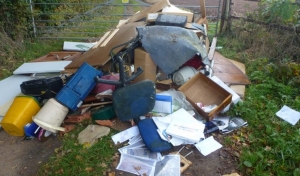
Fly tipping is the illegal dumping of waste. It is anti-social and can cause pollution of the environment and be a physical danger to animals and human beings, spoils the local neighbourhoods and our quality of life.
Waste that is fly-tipped comes in various types such as: garden refuse and green waste; rubbish; large domestic items, washing machines, fridges, sofas and mattresses; furniture; tyres, asbestos and clinical waste.
Large fly tips of waste from construction, demolition, excavation and property renovation activities, which can at times block the highway, prove a serious hazard to the safety of road users, together with the pollution to the environment and animals.
The type of fly tip and size of it can vary dramatically from a single bag of rubbish to large quantities of waste which are dumped from trucks whilst driving along the road.
Waste is found fly tipped in various types of locations such as: verges beside the road, in lay-bys, on the public highway, on private land and even beside the provided bins at recycling sites.
Private land
Fly tipped waste on private land is the responsibility of the land owner, who will need to arrange for its disposal. Malvern Hills District Council will work with land owners where possible to identify offenders, prosecuting where appropriate.
Public Highway
Waste that is fly tipped solely on a public highway is the responsibility of Malvern Hills District Council. Please report online at Fly Tipping and Littering – Malvern Hills District Council
Duty of Care For Householders
Every householder has a ‘duty of care’ to ensure that they have taken reasonable steps to dispose of waste in accordance with the law. You are required by law to ensure that you are handing over your waste to a person or company who is authorised and licensed with a waste carriers licence to transport and dispose of it safely. There are some exceptions to the requirement of a licence, such as charities etc. The person taking away your waste must also keep a record of this, a waste transfer note, held for two years.
Handing over your waste without asking questions may lead to your waste being fly tipped and you being partly responsible and therefore liable to enforcement action being taken against you.
Further information regarding discharging your duty regarding the public register of licensed waste carriers(link is external).
The Environment Agency has a public register of waste carriers which you can use to see if an individual or firm holds a waste carriers registration certificate check online(link is external).
Bulky large items of waste can be taken away by our special refuse collection. Book a collection online at Bulky Waste – Malvern Hills District Council
Witnessing Fly Tipping
If you witness fly tipping or discover a fly tip, any information you give may help the investigation and lead to a prosecution of the offender. It would be useful if you could record the details and report it immediately.
Please do not put yourself at risk.
- registration number of vehicle
- colour and make of vehicle
- any signwriting or distinctive marks on the vehicle
- time and date
- number of people involved
- a description of the people and their clothing especially if distinctive
- anything heard which may help identify them, names, etc.
- what has been fly tipped
- is it tipped on the footpath or carriageway
- is it public highway
Do not:
- touch the waste as it may contain syringes, asbestos or hazardous substances
- disturb the site, as there may be evidence that could help identify the fly-tippers
- approach anyone you see fly tipping
All information is valuable to us and will be treated confidentially. If you take photos (e.g. camera phones) please inform us.
Fly tipped waste must be collected and disposed of in accordance with the law therefore it is always best to report fly tips to the council so that they can advise accordingly on the correct disposal of the waste. Please note that Malvern Hills District Council are only responsible for the clearance of waste from public land.
